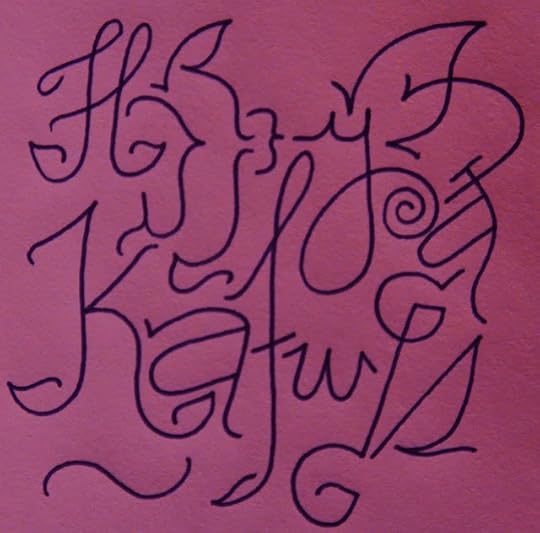Palmword
 Geof Huth, "Kafwgs" (15 June 2011)
Geof Huth, "Kafwgs" (15 June 2011)I draw with my hands. I'm a wright of words, some not known. I am a wrighter, yet the creatures of my pen have fallen over and won't right themselves. A wordwright, I don't depend on words for meaning.
The little fidgetglyph above is a mere bag of shells, a pear-shaped creation, something is not right with it, and I wrote it this morning, or I drew it, or I don't know the difference between writing and drawing at some points during the day, and this was during the morning as the brand-new commissioner of my state agency gave a little welcome speech to us, huddled masses accumulated at 32 locations throughout the state.
A fidgetglyph is a doodle assigned the significance of assured retention. (At times of stress, I succumb to the jargon of my profession.) A fidgetglyph is a doodle attempting to be writing and drawing simultaneously. For this reason, a fidgetglyph is a thing given shape, and it is through its shapes that it means. It impinges upon the eyes, sometimes modestly, sometimes extravagantly, sometimes miniaturely, sometimes hugely. But it is meant to be small and without ambition.
The idea here is that smallness may have a value, that a palmword may be better than a book of words, that the accumulation of smallnesses may lead to revelations about the process of reading, which is a central fact of the process of being contemporaneously human.
Not even a single word is needed to make something a poem. Not even a single recognizable letter. The gesture is what is important, the movement of a hand that makes a mark on the page that seems to be writerly.
Visual poets make writerly works for they are writerly people. They focus on writing, marks made and left and persisting in visible space.
Some may conclude that such works (poems that reject the need for words of any kind, only the mere sense that a word could be made out of visual meshes of text) are necessarily avant-garde. But I don't think so. The avant-garde died decades ago. People work, even struggle, to produce works that are different from any ever made, and they always succeed, and they always fail, for differences come in degrees rather than absolutes, and everything that could be done was done before we had been born.
The avant-garde is a myth generated by those conservative enough to believe in their ability to transcend those who preceded them, but everything is marked (in the linguistic sense, in the sense of darkness, through the sense we make of the world) with the trillions of works of art or merely makings created in the long and attenuated past. We are not creatures of genius and transcendence.
We are runners who have taken batons from other runners, and we are running the last leg of a race that will never end.
ecr. l'inf.
Published on June 15, 2011 20:29
No comments have been added yet.



